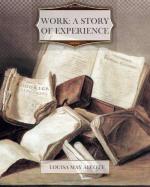Christie felt this to her heart’s core, and for a moment longed to end the struggle, say, “Take me,” and accept the shadow for the substance. But those last words of his vividly recalled the compact made with David that happy birthday night. How could she be his friend if she was Mr. Fletcher’s wife? She knew she could not be true to both, while her heart reversed the sentiment she then would owe them: David’s friendship was dearer than Philip’s love, and she would keep it at all costs. These thoughts flashed through her mind in the drawing of a breath, and she looked up, saying steadily in spite of wet eyes and still burning cheeks:
“Hope nothing; wait for nothing from me. I will have no more delusions for either of us: it is weak and wicked, for I know I shall not change. Some time we may venture to be friends perhaps, but not now. Forgive me, and be sure I shall suffer more than you for this mistake of mine.”
When she had denied his suit before he had been ungenerous and angry; for his pride was hurt and his will thwarted: now his heart bled and hope died hard; but all that was manliest in him rose to help him bear the loss, for this love was genuine, and made him both just and kind. His face was pale with the pain of that fruitless passion, and his voice betrayed how hard he strove for self-control, as he said hurriedly:
“You need not suffer: this mistake has given me the happiest hours of my life, and I am better for having known so sweet and true a woman. God bless you, Christie!” and with a quick embrace that startled her by its suddenness and strength he left her, standing there alone before the three grim Fates.
CHAPTER XV.
Midsummer.
“Now it is all over. I shall never have another chance like that, and must make up my mind to be a lonely and laborious spinster all my life. Youth is going fast, and I have little in myself to attract or win, though David did call me ‘good and lovely.’ Ah, well, I’ll try to deserve his praise, and not let disappointment sour or sadden me. Better to hope and wait all my life than marry without love.”
Christie often said this to herself during the hard days that followed Mr. Fletcher’s disappearance; a disappearance, by the way, which caused Mr. Power much satisfaction, though he only betrayed it by added kindness to Christie, and in his manner an increased respect very comforting to her.
But she missed her lover, for nothing now broke up the monotony of a useful life. She had enjoyed that little episode; for it had lent romance to every thing while it lasted, even the charity basket with which she went her rounds; for Mr. Fletcher often met her by accident apparently, and carried it as if to prove the sincerity of his devotion. No bouquets came now; no graceful little notes with books or invitations to some coveted pleasure; no dangerously delightful




